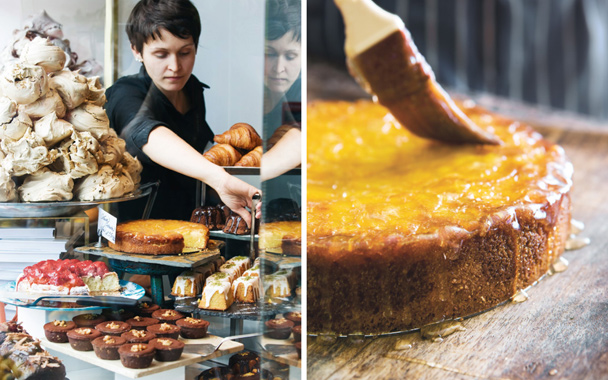It’s 11 a.m., just before the midday rush at Ottolenghi, in Islington. Freshly made food, piled in colorful mountains on giant platters, is flying by on its way upstairs. Sami Tamimi, junior partner and creative spark, eyeballs everything, adding purple onions here, cherry tomatoes there. “We sell with the eyes as much as the tongue,” says Yotam Ottolenghi, Tamimi’s senior business partner and the shop’s namesake.
Both Tamimi and Ottolenghi are handsome, gay, and turn 41 years old this year. Both wear smart brown-rimmed glasses, and were born in Jerusalem not long after the 1967 war. But there’s no mistaking one for the other. Ottolenghi, the taller, chattier one, was born on the Jewish side of the city and grew up, in his words, “in the heart of the Israeli establishment.” Tamimi, who is Palestinian, is from East Jerusalem. The success of their collaboration is all the more poignant given the geographic proximity and cultural dissimilarities of their earlier lives.
Ottolenghi’s mother is of German descent, and his father is Italian. Growing up, he was never far from his Italian roots. His grandmother re-created her own private Little Italy in her Tel Aviv suburb, speaking Italian to her relatives and her maid, outfitting her home in rustic 19th-century Tuscan furnishings, and sipping imported espresso every afternoon. Ottolenghi was stricken with the Italian obsession with food at an early age and even today brags that it was the Jews of Rome who are credited with introducing the fried artichoke to Italy.
Tamimi was the youngest child in a large, secular, middle-class Arab family. Both of his parents cooked (many Arab men don’t), and he remembers his mother rolling cigarette-thin vine leaves and his father squatting on the floor, preparing food in the traditional style. At 15, Tamimi left the narrow confines of the Old City and entered Israeli life. He got a job as a porter (“the lowliest and hardest job in any kitchen”) at the Mount Zion Hotel and decided that cooking would be his ticket out of the tradition-bound Arab culture he was determined to escape.
Within a few years of each other, Ottolenghi and Tamimi had left Jerusalem for more cosmopolitan Tel Aviv. Ottolenghi studied philosophy, art, and comparative literature by day and worked on the news desk of Haaretz, one of Israel’s largest daily papers, at night. Tamimi dyed his hair pink and cooked at Lilith (the first restaurant to introduce California cuisine to Israel), where, by the 1990s, he had risen to head chef. He also worked as a private chef, expanding his repertoire to include foods like quiches, jams, and matzo balls. (“They’re the best I’ve ever eaten,” Ottolenghi says. “Light as a feather and with big flavor.”)
In 1997, both men moved to London—again, independently. Ottolenghi was planning to pursue a Ph.D., but before enrolling at university, he signed up for a course at Le Cordon Bleu just to prove to himself that he wasn’t cut out for professional cooking. In less than a year, though, he found himself explaining to his parents why, at age 30, he’d decided to forsake a promising academic career in order to knead dough. He landed a gig as a pastry chef at the boutique bakery and food shop Baker & Spice, where he met Tamimi, who had been causing a stir with the edgy Middle Eastern spin he’d been putting on bland British standards.
“We talked in English for the first half hour,” Ottolenghi recalls, “and I couldn’t tell where he was from. He has no Arabic accent in Hebrew, so I thought he was Jewish Israeli.” Bonding over the shock of British culinary creations like mince pie (“You never get over it,” says Tamimi)—not to mention their spookily corresponding pasts—they became fast friends.
With a group of additional partners, the pair opened the original Ottolenghi, in trendy Notting Hill, in the summer of 2002. In the front window, they delicately arranged a few pastries around a large vase of blooms. “Congratulations on the new flower shop,” one of the first customers remarked on entering. “We had an image problem in the beginning,” says Ottolenghi. “No one knew we were a food shop because we didn’t have the confidence to do big, generous displays.” Today, on the other hand, the windows of all four Ottolenghi shops feature magnificent tableaux of sumptuous delights. “Both our characters are fairly reserved,” says Ottolenghi. “I suppose we use food as a way of being flamboyant.”



 Pinterest
Pinterest






